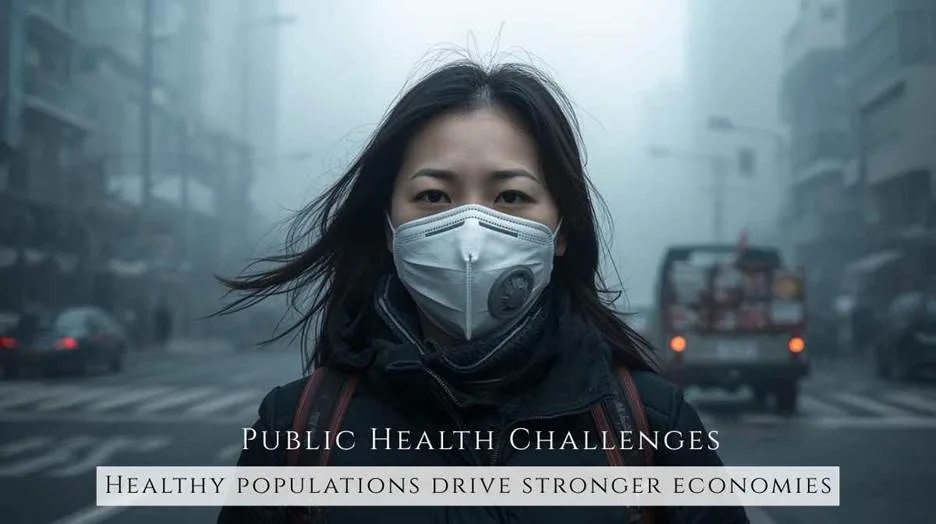Public health challenges are among the most pressing issues of our time, shaping how societies function and how people live. From preventing infectious diseases to tackling the rise of chronic conditions, public health challenges directly affect quality of life, healthcare systems, and global economies. As communities evolve and technology advances, new health risks emerge, requiring both innovation and collective action. This article explores what these challenges mean, why they matter, and how societies worldwide can address them. By examining their roots, importance, benefits of strong public health systems, and real-world examples, we can better understand how to move toward healthier communities.

What Do Public Health Challenges Really Mean?
Public health challenges refer to the obstacles and threats that hinder communities from achieving good health outcomes. These include infectious diseases, non-communicable conditions like diabetes or heart disease, mental health concerns, lack of access to healthcare, and environmental risks such as pollution.
- They highlight gaps between what is possible and what is actually achieved in population health
- They vary between regions depending on resources, culture, and infrastructure
- They evolve over time, influenced by globalization, technology, and demographics
Understanding this concept allows us to see that public health challenges are not only medical issues but also social, economic, and political concerns.
Why Public Health Challenges Have Existed Through History
The roots of public health challenges stretch back centuries. In the 14th century, the Black Death devastated Europe, exposing weaknesses in sanitation and urban planning. During the 19th century, industrialization brought overcrowding, poor air quality, and unsafe working conditions. In the 20th century, world wars and global pandemics tested the resilience of health systems.
History shows us that every era has faced unique threats, but the response has shaped future progress. Vaccination campaigns, sanitation reforms, and improved nutrition emerged as solutions that saved millions of lives. Today’s challenges may differ, but the lessons from history prove that collective action and science can overcome even the greatest health threats.
Why Addressing Public Health Challenges Matters
Strong responses to public health challenges create healthier, more productive societies. Addressing them is essential because:
- Healthy populations drive stronger economies
- Prevention reduces healthcare costs long-term
- Communities with good health enjoy higher life expectancy and social stability
For example, the World Health Organization (WHO) estimates that investing in preventive care saves billions in treatment expenses. This shows that overcoming these challenges is not just a medical necessity but also a smart economic strategy.
Key Benefits of Tackling Public Health Challenges
When communities successfully address health obstacles, the benefits extend beyond healthcare:
- Improved Quality of Life: Fewer illnesses mean more people can live fulfilling lives.
- Reduced Inequalities: Accessible healthcare helps bridge gaps between rich and poor.
- Resilient Communities: Preparedness against pandemics ensures quicker recovery.
- Innovation in Health Systems: New technologies, like telemedicine, improve access to care.
These benefits emphasize that fighting public health challenges builds stronger, fairer societies for everyone.
The Most Pressing Public Health Challenges Today
Modern societies face a mix of traditional and new challenges:
- Infectious Diseases: COVID-19 reminded us of how quickly viruses can disrupt lives.
- Non-Communicable Diseases (NCDs): Heart disease, obesity, and diabetes now dominate health concerns worldwide.
- Mental Health Issues: Stress, anxiety, and depression have surged, especially in urban areas.
- Environmental Risks: Air pollution, unsafe water, and climate change impact millions each year.
- Health Inequities: Rural populations and marginalized groups often lack access to basic healthcare.
These examples reveal the complexity of modern public health challenges and the need for multi-layered solutions.

Real-World Examples of Overcoming Challenges
There are inspiring cases where communities have tackled these issues successfully:
- Smallpox Eradication: Through global vaccination campaigns, smallpox was declared eradicated in 1980.
- Anti-Tobacco Campaigns: Policies and awareness drives reduced smoking rates significantly in many countries.
- COVID-19 Vaccination Drives: Though unequal, they showcased how rapid innovation can save lives.
Such examples prove that with the right mix of policy, science, and community effort, public health challenges can be transformed into opportunities for progress.
How Can We Tackle Public Health Challenges More Effectively?
Overcoming barriers requires a combination of strategies:
- Strengthen Healthcare Systems: Improve funding, workforce training, and infrastructure.
- Promote Preventive Care: Encourage vaccinations, screenings, and healthy lifestyle habits.
- Leverage Technology: Use telemedicine, data analytics, and AI to expand healthcare access.
- Global Cooperation: Share knowledge and resources across borders to combat pandemics.
- Community Involvement: Engage local leaders and citizens in awareness campaigns.
These strategies highlight that addressing public health challenges is not the responsibility of governments alone but requires a united effort.
Conclusion: Facing Public Health Challenges Together
Public health challenges are not new, but they are becoming more complex with globalization, climate change, and shifting demographics. They demand proactive solutions that combine innovation, policy, and community action. By learning from history, recognizing the importance of prevention, and embracing technology, societies can overcome even the toughest obstacles. Staying informed and supporting efforts to address these challenges is a responsibility we all share. Together, we can build a healthier and more resilient future.
